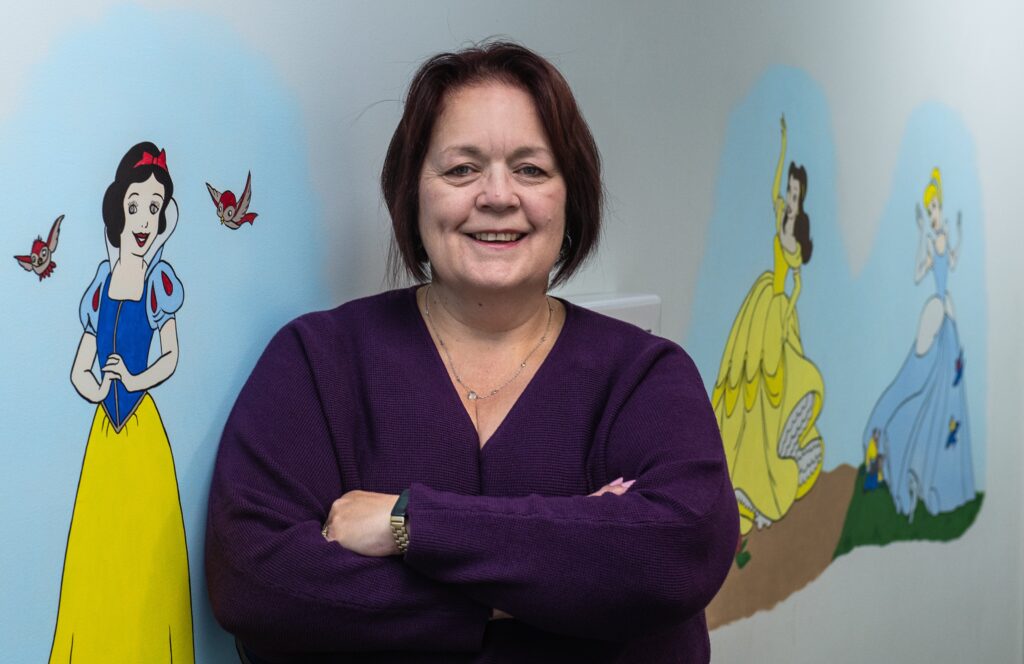
LEWISTON, October 3, 2025 - Dr. Linda Glass stands Friday afternoon in a hallway at her practice, Pediatric Associates, on Mollison Way in Lewiston. (Russ Dillingham/Sun Journal)
In the wake of shifting federal guidelines, healthcare providers in Maine are encountering increased inquiries from parents regarding the safety and efficacy of vaccines for their children. Dr. Linda Glass of Pediatric Associates in Lewiston emphasizes that while parents’ concerns are valid, vaccines should not be feared. “The majority of what we normally hear is, No. 1, safety, because everybody loves their children and they want them to be safe. That’s a paramount issue for parents,” she stated.
Pediatricians report a surge in questions about vaccinations following the COVID-19 pandemic, reflecting a broader uncertainty fueled by recent changes in federal recommendations. The Advisory Committee on Immunization Practices, part of the federal Centers for Disease Control and Prevention (CDC), recently modified its guidance regarding childhood vaccines. This shift comes after decades of consensus among national medical organizations and the government on vaccination schedules.
The American Academy of Pediatrics outlines a comprehensive schedule for children aged 6 and under, as well as those between 7 and 18, recommending vaccines such as flu, measles, mumps, rubella (MMR), COVID-19, hepatitis A and B, meningitis B, and human papillomavirus (HPV). However, a meeting on September 18 resulted in recommendations that the updated COVID-19 vaccine should be available without a prescription only for individuals aged 65 and older or those aged 6 months and older with at least one underlying health condition. All others are advised to obtain a prescription from their healthcare provider before vaccination.
Additionally, Governor Janet Mills issued an order in September requiring Maine healthcare professionals to administer this year’s COVID-19 vaccine to anyone aged 6 months or older, regardless of prescriptions. The Immunization Committee also suggested that the combined MMR-V vaccine should not be given to children under 4 years old, advocating for the separation of these vaccines into individual shots.
Approximately 85% of children in the U.S. already receive the MMR vaccines separately, according to a report from National Public Radio. During the same meeting, discussions around the hepatitis B vaccine’s administration timing were tabled indefinitely, despite its critical role in preventing severe infections.
Dr. Glass supports the efficacy of vaccines, including the HPV vaccine, which has been proven safe and effective. The CDC notes that about 10% of women with an HPV infection are at risk of developing long-lasting infections, increasing their susceptibility to cervical cancer. Since the HPV vaccine was introduced nearly 20 years ago, the rate of cervical cancer has steadily declined, from 11 cases per 100,000 in 1992 to seven in 2022, as reported by the National Cancer Institute.
The CDC estimates that of the 37,800 cancers attributed to HPV from 2017 to 2021, approximately 35,000 could have been prevented by vaccination. Despite the clear benefits, the topic of HPV can be sensitive for parents due to its association with sexual activity.
Dr. Glass also highlights the importance of the hepatitis B vaccine, which has significantly reduced the rate of infections among newborns since its introduction in 1991. Reported cases of acute hepatitis B have decreased from over 15,000 in 1991 to fewer than 5,000 in 2023, positioning the U.S. within reach of eliminating the virus. Administering the vaccine at birth reduces the risk of mother-to-child transmission by 75%, according to the CDC.
Despite these proven benefits, some parents in Dr. Glass’s practice are hesitant to vaccinate their newborns in the hospital, opting to wait until they are at home. This growing scrutiny reflects a trend where parents question the necessity of vaccinations for infants. “One of the first things every parent wants to know is, ‘Why is my child at risk for this when they’re born?’” Dr. Glass explained, noting that new parents often feel uncertain in the hospital environment.
Family physician Dr. Steve Bien from Farmington has observed similar trends, stating that vaccine success has led to a decline in visible cases of preventable diseases like chickenpox. “I can’t say the last time I saw chickenpox, so these things have just disappeared,” he remarked. He also noted that the increase in vaccines administered to children can be overwhelming for both children and parents, contributing to anxiety during vaccination appointments.
Conversations about newer vaccines, particularly for flu and COVID-19, have become more frequent and often last longer, reflecting parents’ concerns about these regularly updated immunizations. The pandemic has altered public perception of vaccines, with some individuals viewing government recommendations as an overreach rather than a public health measure.
Dr. Bien emphasized that physicians have traditionally served as primary sources of medical information, but many parents now turn to independent sources online, resulting in increased scrutiny and questions. Nonetheless, he affirms that immunizations have significantly improved public health outcomes.
Maine maintains a robust public health program, and as long as there are no significant changes to public health policies, the state is expected to continue leading in best immunization practices. Dr. Glass encourages open dialogue between parents and healthcare providers, stating, “You need to know both sides before you make decisions because you’re not going to have a perfect immunization, you’re not going to have a perfect medicine, it doesn’t happen.” She believes that asking questions is beneficial, but she urges against fostering fear around vaccinations due to inquiries.
Dr. Glass encapsulates the need for informed discussions, emphasizing that “questioning doesn’t mean it’s wrong; questions are questions.”







